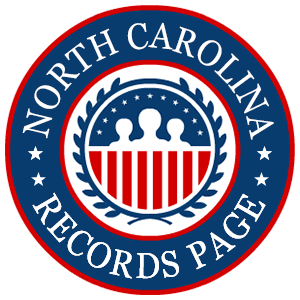Perform a search for free North Carolina divorce records today.
Records of divorce can be used for various reasons, such as performing a genealogy search or learning more about someone in your life. Documents verifying that a divorce has been finalized can also be used to prove one’s marital status for different legal or business reasons.
The North Carolina Public Records Law provides citizens access to many types of government documents, including divorce records; however, the key to an efficient and effective search is knowing where to find them.
Check out this resource to discover how to search for divorce records in North Carolina, the different types of documents you can access, and any tools that can assist you during this process.
This resource was written by Attorney Robert Bailey Jr, who holds a Juris Doctorate from Widener University School of Law.
Are Divorce Records Publicly Available in North Carolina?
Under the North Carolina Public Records Law, divorce records are considered public information.1 This means that citizens can look up case records and receive informational copies of divorce documents.
However, there are types of divorce records that are limited to a small group of eligible people. Certified records, which are often used for business or legal reasons, can only be requested by the following eligible people:
- The person listed on the record
- Spouse
- Sibling
- Direct ancestor or descendant
- Stepparent or stepchild
- A person making a request for a legal determination of rights
- Legal representative, attorney or authorized agent of any of the above people
You can also access other types of divorce data. North Carolina State Center for Health Statistics provides a yearly volume of vital statistics that contains data on divorce by different variables.2
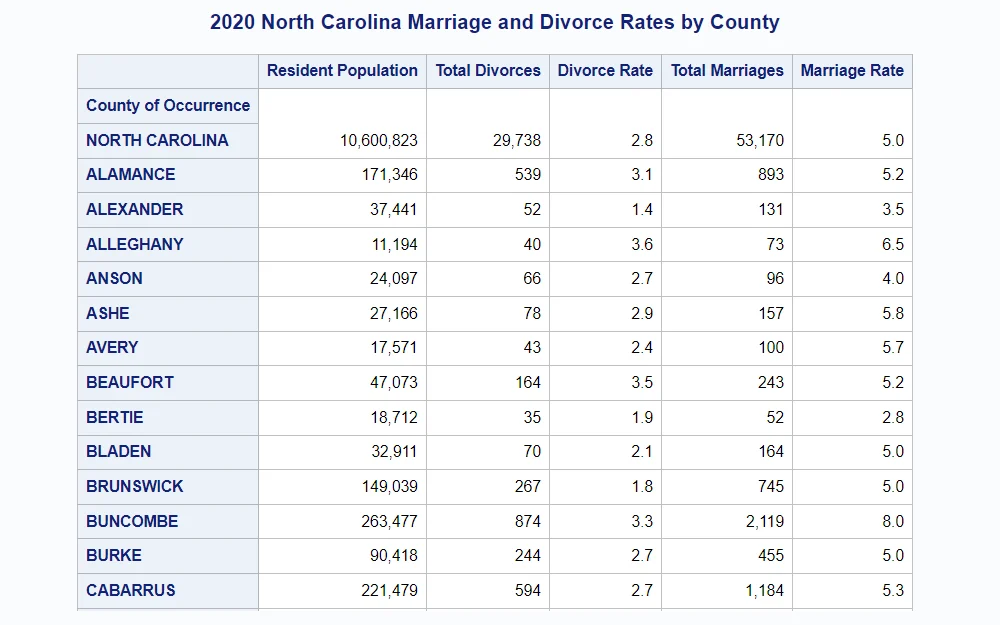
You can also get divorce data from the Centers for Disease Control and Prevention’s National Center for Health Statistics.
The most recent rates in North Carolina (2021) indicate there are 2.1 divorces for every 1,000 people.
How To Search Free North Carolina Divorce Records
If a citizen is looking to search statewide divorce records, one option is to use online resources to access the case.
A record seeker can perform a free public divorce records search using the North Carolina eCourts Search Tool. To use this online tool, click “smart search” and then click the option to conduct an advanced search.
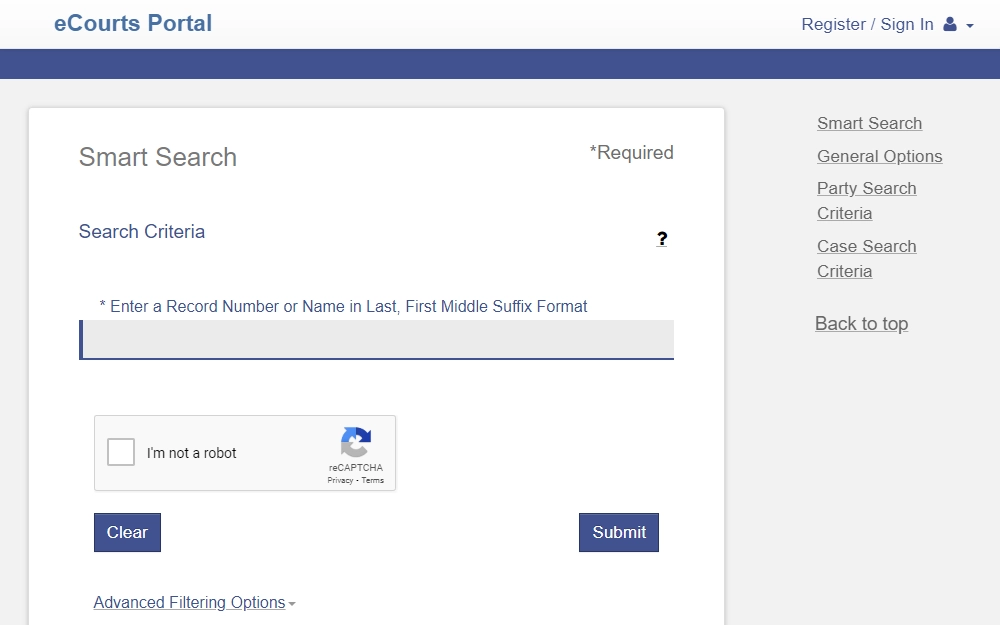
With the advanced search, you can filter the cases down to Family law cases (which includes divorces). You can then search by party name or case number. If you want, you can further narrow your search results by selecting a specific county or filing date range.
There are other options to filter your results as well, depending on the information you have available.
Once you get to the search results page, you can see the case number, party names, status and court location. You can click on the case number to get additional information. Now, you can view details on the disposition of the case, such as when the divorce decree was entered.
You can also view a chronological history of all events associated with the case.
For additional information, you may need to search the case record in person. To do so, contact the Clerk of Courts in the County where the divorce occurred.5
Note: This tool is not available in every county but will eventually contain records throughout North Carolina. 12 additional counties will be added to this search tool by February 2024.
How To Submit a Divorce Certificate Request in North Carolina
A divorce certificate is a document issued by a government agency that indicates that a person dissolved their marriage and provides basic information establishing that fact.
A citizen can request a certificate of divorce from the North Carolina Division of Public Health Office of Vital Records.6 Certificates are available from 1958 to the present.
To request a certificate of divorce, you must be able to provide the following information:
- Names of spouses
- Divorce date
- Location of divorce (city or county)
- Requestor’s relationship to the person on the record (for certified copies only)
Requests for a certificate can be made in person or by mail. In-person requests are by appointment only. Appointments are available Monday through Friday, from 8:30 AM to 3:00 PM. For in-person expedited service, there is an additional $15.00 fee.
For orders by mail, complete an Application for Certificate of Divorce and mail it to the address below:7
North Carolina Vital Records
ATTN: VC Certificate Orders
1903 Mail Service Center
Raleigh, North Carolina 27699
The cost of a certificate of divorce is $24.00. This is a non-refundable search fee, even if the record requested is not found.
In addition to requesting with the Office of Vital Records, you can also make a request online or by phone with VitalChek. They are the only third-party authorized vendor for North Carolina certificates of divorce. Use of this service includes additional fees.
Finding Divorce Records Through County Repositories in NC
There are alternatives to conducting a statewide search for public divorce records. While there are clear benefits to accessing records at the state level (e.g., broader search), there are also valid reasons for searching desired divorce records at the county level.
For instance, if the records are located in a nearby county, you may like the fact that you can go to the office and search these records or talk to someone about the process. In addition, the process may just be easier when requesting divorce records from a particular county.
To give you a better understanding of how this process may look, below is information on accessing records in North Carolina’s three largest counties (by population).
The largest county in North Carolina and home to the state’s capital (Raleigh) is Wake County. A citizen looking to access records in Wake County can do so by contacting their Clerk of Superior Court.8 You can contact the Clerk by phone at 919-792-4000.
The Clerk of the Superior Court in Wake County is the record custodian for divorce records, and they will guide you through the process of searching or requesting this information. The Wake County Clerk is located at the address below:
Wake County Clerk of Superior Court
316 Fayetteville St.
Raleigh, North Carolina 27601
Mecklenburg County is the second largest in North Carolina, and within it resides the state’s largest city, Charlotte. To obtain Mecklenburg County divorce records, an individual should reach out to the county clerk of court. A citizen can call them at 704-686-0400 to obtain information on how to access divorce records and related information.
The Mecklenburg County Clerk of Court is available at the address below:
Mecklenburg County Clerk of Superior Court
832 E. Fourth St.
Charlotte, North Carolina 28202
The Clerk’s Office is available from 9:00 AM to 5:00 PM, Monday through Friday. During that time, the clerk provides access to public records.
However, the Clerk of Court only has divorce records from 1970 to the present. Mecklenburg County divorce records from 1846 – 1969 can be obtained through the county’s Carolina Room. You can search their Mecklenburg index of divorce records online.9
For additional assistance, you can contact them by email at [email protected] or by phone at 704-416-0150. They are available Monday through Friday from 9:00 AM to 5:00 PM but do not provide in-person visits.
The third largest county in North Carolina is Guilford County. If you want to find divorce records in Guilford County, you can make a request through the Clerk of Superior Court. For specific information on how to either request a divorce record or search in person, you can call them at 336-412-7300.
The Guilford County Clerk of Superior Court is open Monday through Friday, from 8:30 AM to 5:00 PM. To talk to someone directly or search divorce records, you can go to their office located at the address below:
Guilford County Courthouse
201 S. Eugene Street
Greensboro, North Carolina 27401
Note: Both Wake and Mecklenburg County have their divorce records available on North Carolina eCourts Portal. Eventually, Guilford County will be available as counties are being added to the online tool in various waves.
Searching the North Carolina State Divorce Archives for Genealogy & Lineage Research (Free Lookups)
If a person is performing a genealogy search, they will need to access, among other things, archived divorce records.
One option is to perform a search with the North Carolina State Archives.10 They provide various services for genealogy researchers. You can search their government records and see what is available through their online catalog.
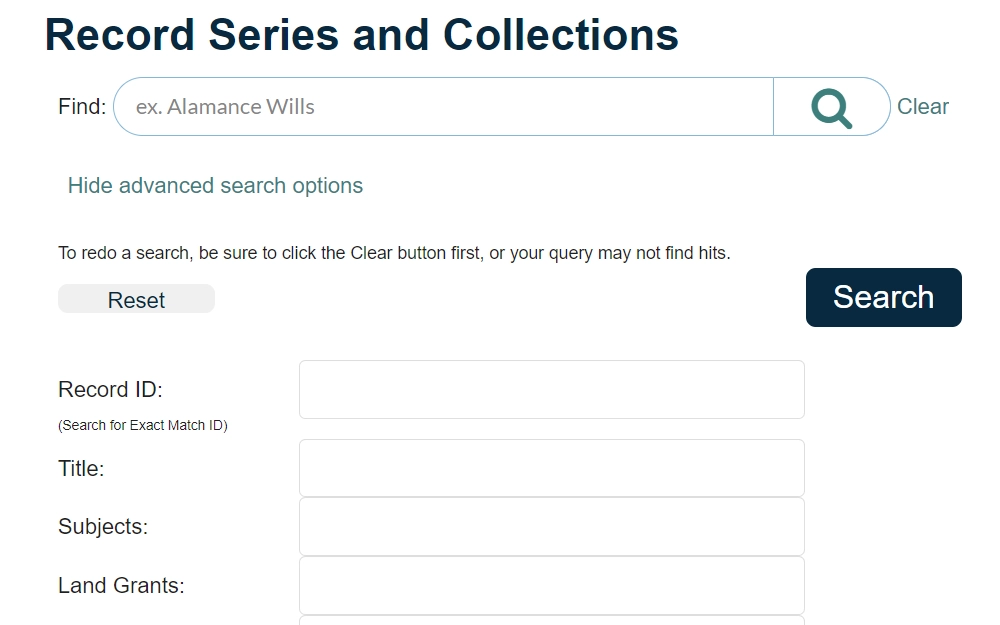
If you have questions about researching archived divorce records, you can contact them by email at [email protected] or by phone at 919-814-6840. To search for records in person, you can go to the address below:
North Carolina State Archives
109 East Jones St.
Raleigh, North Carolina 27601
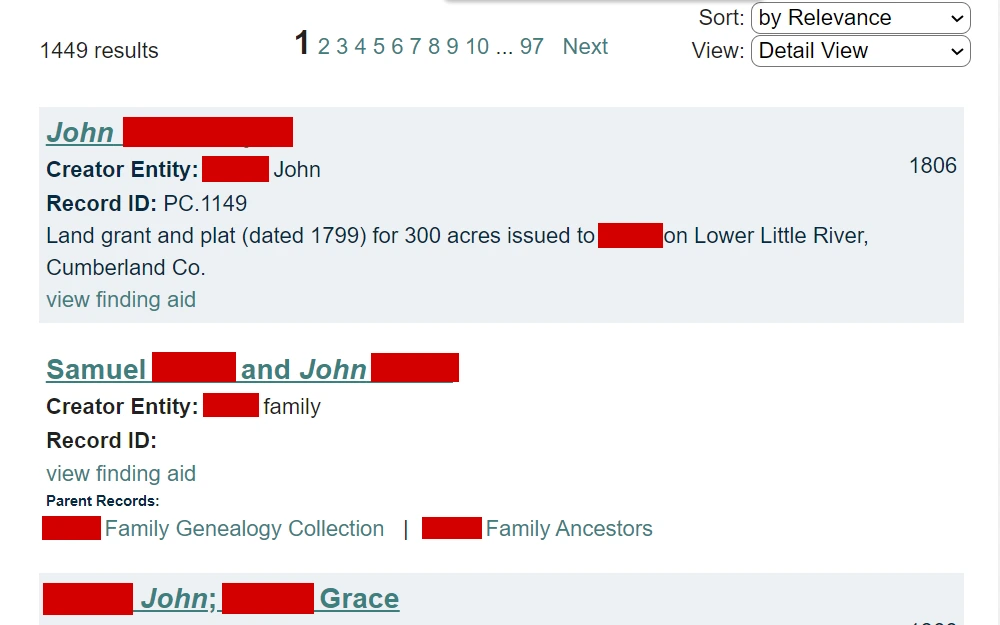
Detailed information is available for visiting the state archives of North Carolina. They also have the following two regional archive research facilities:
Outer Banks History Center
1 Festival Park Blvd.
Manteo, North Carolina 27954
Phone: 252-423-5240
Western Regional Archives
176 Riceville, Rd.
Asheville, North Carolina 28805
Phone: 828-250-3120
You can also perform an archived records search for divorce information with the North Carolina State Library.12 They provide online resources for searching one’s genealogy. If you have questions about the kind of archived records they have available, you can call them at 919-814-6780.
They are open Tuesday through Friday from 9:00 AM to 5:00 PM. You can search their available records in person at the address below:
North Carolina State Library
109 E. Jones Street
Raleigh, North Carolina 27601
Another option for searching archived divorce records is through the Clerk of Court in the County where the divorce was filed. The Clerk of Court is the record custodian for divorce records in North Carolina.
There are some other miscellaneous options for searching divorce records as well. For instance, you may be able to find a divorce index or archived records with another public library, historical society or even church. This information can also be found in old documents such as newspapers.
How To Access Information About Dissolutions of Marriage & Common Law Divorces in North Carolina
In North Carolina, a dissolution of marriage and divorce are the same thing. If you’re seeking information on a dissolution of marriage, you can perform a search with the North Carolina eCourts Search Tool if it occurred in a county that is currently live on this system. Otherwise, you’ll have to perform a search in the county where the dissolution occurred.
Legal separations can be accessed in the same way as dissolutions if they have been filed with the court.
The other option for obtaining information on a dissolution is to request a certificate through the North Carolina Division of Public Health Office of Vital Records or an approved third-party vendor, VitalChek. VitalChek provides both an online and phone service that is not provided by the Office of Vital Records; however, there are additional fees.
Common law marriage is a legal concept that allows parties to be considered legally married if they hold themselves out as such, even though they never went through the formal process. Recognition of common-law marriage depends on the state, and North Carolina does not recognize this legal concept. As a result, there is no such principle as common law divorce in North Carolina.
North Carolina does not recognize civil unions or domestic partnerships by state statute. As a result, there are no divorces to access for these types of relationships. However, North Carolina has recognized same-sex marriage since October 10, 2014.
Any divorces of same-sex couples can be accessed in the same way as outlined earlier in this section for dissolutions.
How To Apply for a Divorce & Respond to Divorce Notices in North Carolina
If you are considering ending your nuptials, it’s helpful to inform yourself as to how the process works in North Carolina. Since divorces are controlled by state law, each state may have its own requirements for applying for one.
If you’re a spouse who was just served with divorce papers, you also need to understand what your next steps should be.
To file for divorce in North Carolina, you are required to meet both a separation requirement and a residency requirement.13 The residency requirement is that a person has to have lived in North Carolina for six months or more before filing for divorce. The separation requirement only allows a divorce to proceed if both parties were separated for over a year.
If a person meets those requirements, then they can proceed with filing a divorce. There is no other way to speed up the process, as North Carolina is a no-fault state. That means the only ground for divorce is that the marriage is irretrievably broken and that the above requirements have been met.
Note: Some states allow for at-fault divorces, which is where one party files based on certain actions of the other party (e.g., desertion, adultery, etc.).
Once you are ready, you can prepare and file a complaint for divorce. The complaint will state the basis for the divorce, along with what you are requesting as part of the final decree. This may include your proposal for how the property should be divided, spousal support, child custody and others.
Along with the complaint, you must include the filing fee and the additional required documents: Domestic Civil Action Cover Sheet, Summons and Service members Civil Relief Act Declaration.
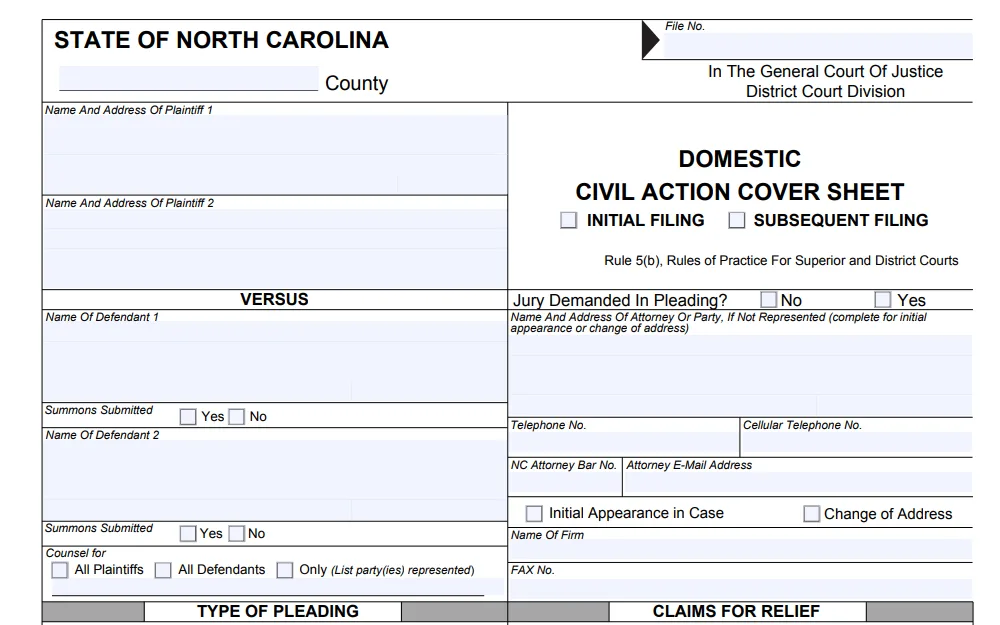
Another requirement is to make sure your spouse receives a copy of the divorce complaint. This can be done by having it delivered by a sheriff or delivering it yourself and filing proof with the court that your spouse received the complaint.
If neither of those options is successful, your last option for service is to notify your spouse that you plan to end your matrimony by publication in a newspaper.
If you are on the receiving end of a divorce complaint, you have 30 days to file an Answer. If you agree with everything in your partner’s complaint, you do not have to file an answer, but be aware that if you fail to raise certain claims, you may be prevented from requesting them in the future.
Regardless of what side you are on in the divorce process, it is always a good idea to talk to a North Carolina licensed family law attorney. They can guide you through the various steps of the process and give you assurance that you are making informed decisions.
In North Carolina, you can also consider getting a legal separation. Separation occurs when parties are living apart, and one party intends for that status to be permanent. However, it may be wise to get a separation agreement to resolve lingering issues such as the division of property, alimony and more.
You can even use some of the same tools people use when legally ending a marriage, such as mediation and a divorce appraisal.
With this information, you should have a solid understanding of how the divorce process starts; additionally, you have the resources and tools necessary to conduct a thorough search of North Carolina divorce records.
You can also refer to the instructions for viewing all free public records in North Carolina for streamlined steps on accessing warrant details, arrest records, birth and death documents, background checks, court case records, and much more.
References
1North Carolina Judicial Branch. (n.d.). About North Carolina Public Records Law. Retrieved November 13, 2023, from <https://www.nccourts.gov/services/request-a-public-record/about-north-carolina-public-records-law>
2NCDHHS Division of Public Health. (n.d.). Statistics and Reports | Vital. Retrieved November 13, 2023, from <https://schs.dph.ncdhhs.gov/data/vital.cfm>
3NCDHHS Division of Public Health. (2020). 2020 North Carolina Marriage and Divorce Rates by County. Retrieved November 13, 2023, from <https://schs.dph.ncdhhs.gov/data/marriage_divorce_rpts/2020-MarriageAndDivorceRatesByMonth.html>
4North Carolina Judicial Branch. (n.d.). eCourts Portal | Smart Search. Retrieved November 13, 2023, from <https://portal-nc.tylertech.cloud/Portal/Home/Dashboard/29>
5North Carolina Judicial Branch. (n.d.). Locations. Retrieved 13, November, from <https://www.nccourts.gov/locations>
6NCDHHS Division of Public Health. (n.d.). NC Vital Records: Order a Certificate. Retrieved November 13, 2023, from <https://vitalrecords.nc.gov/order.htm>
7NCDHHS Division of Public Health. (2022, April). Application for a copy of a North Carolina Divorce Certificate. VitalChek. Retrieved November 13, 2023, from <https://www.vitalchek.com/Fax-Phone/NC%20Divorce%20Certificate%20App.pdf>
8North Carolina Judicial Branch. (n.d.). Wake County. Retrieved November 13, 2023, from <https://www.nccourts.gov/locations/wake-county>
9Charlotte-Mecklenburg Library. (n.d.). Divorce Records Index 1846-1969. Retrieved November 13, 2023, from <https://www.cmstory.org/exhibits/divorce-records#:~:text=For%20divorce%20records%20from%20the,microfilm%20in%20the%20Carolina%20Room.>
10State Archives of North Carolina. (n.d.). Contact. Retrieved November 13, 2023, from <https://archives.ncdcr.gov/contact>
11State Archives of North Carolina. (n.d.). Record Series and Collections. Retrieved November 13, 2023, from <https://archives.ncdcr.gov/search-catalog/search-doc>
12State Library of North Carolina. (n.d.). Genealogy and Family History. Retrieved November 13, 2023, from <https://statelibrary.ncdcr.gov/genealogy-and-family-history>
13North Carolina Judicial Branch. (n.d.). Separation and Divorce. Retrieved November 13, 2023, from <https://www.nccourts.gov/help-topics/divorce-and-marriage/separation-and-divorce>
14North Carolina Judicial Branch. (2014, January). Domestic Civil Action Cover Sheet. Retrieved November 13, 2023, from <https://www.nccourts.gov/assets/documents/forms/cv750-en.pdf?VersionId=5WHeMjUjHBLMpP04v2Nx_bz60tSPiJXA>
